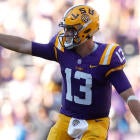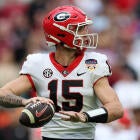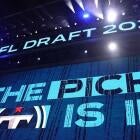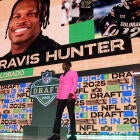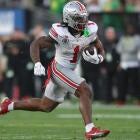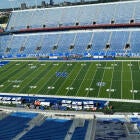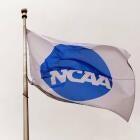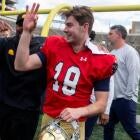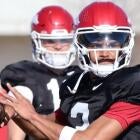The NCAA does not legislate morality well.
We know that because -- as of last month -- restrictions were lifted allowing wine and beer at all NCAA championship events. For decades before that, Carrie Nation could have been a corporate sponsor for the Final Four.
We know that because the NCAA had no business sanctioning Penn State athletically for crimes decided in a courtroom.
We know that because it defended a lawsuit filed by the family of a deceased Division III player by saying it had no "legal duty to protect student-athletes."
Now comes the U.S. Supreme Court's decision allowing states to legislate the legality of sports betting. That marks a tectonic shift in the foundational plates that hold the NCAA in place.
The decision makes it possible for any quarterback or point guard to legally walk into a state gambling establishment and place a wager on not only their sport but their team.
Goodbye, bookie; hello, playing hookie.
Before you clutch your pearls, this decision does not mean gambling on sports is suddenly legal nationwide. It is now up to the states themselves to determine whether -- and in what capacity -- they wish to establish sports betting.
The scenario described above has probably been occurring legally for years in Las Vegas. Both the Mountain West and Pac-12 (among other conferences) play conference tournaments there. The Las Vegas Bowl is played there. The new Raiders stadium will be the future home of UNLV -- and potentially Final Four games as early as 2027.
For years, Nevada state law has allowed bets on college games, including those played within its borders. We would have to be naive to believe that a bet has never been made by a competing party on either their game or another one being played, considering the proximity and wide availability of casinos in the area.
Sure, that's against NCAA gambling bylaws. But guess what? College sports didn't suddenly become professional wrestling -- predetermined. To the best of anyone's knowledge, not one of those games was thrown and points weren't shaved.
Change is coming to the NCAA, as is always the case. Until a few years ago, paying players was a rules violation. Then the NCAA membership dressed it up with terms like "cost of attendance" and "bowl gifts." Until April 18, guzzling booze at all NCAA championship events wasn't allowed. Until it was.
"It's a loosening of social mores and law," said Craig Thompson, Mountain West commissioner and Division I basketball selection committee member. "I'm sure they're scrambling this morning in Indianapolis, trying to figure it out."
The NCAA doesn't need a rulebook, it needs the National Guard. It seems to be under attack on all fronts. Between the FBI probe, the College Basketball Commission, the Knight Commission, ongoing lawsuits and Monday's Supreme Court ruling, how long does the current amateurism model last?
Last week alone, four significant figures supported athletes making money off their name, image and likeness: Condoleezza Rice, Michigan coach Jim Harbaugh, Penn State athletic director Sandy Barbour and North Carolina congressman Mark Walker.
The association isn't likely to relax its gambling rules even in the aftermath of Monday's ruling -- and maybe it shouldn't do so. The point is that the NCAA must, in some way, recognize changing social mores. Whatever your politics, we live in an age when marijuana has been legalized for recreational use in nine states.
Six states had been in the process of enacting sports betting legislation before Monday's ruling: Pennsylvania, Connecticut, New York, New Jersey, West Virginia and Mississippi.
There are going to be laws allowing those of age to gamble and smoke pot. There are NCAA rules against it.
How does that work out? Probably the same way the NCAA has dealt with Baylor and Michigan State. These are schools where abuses were allegedly enabled, too. Where are the Penn State-level penalties?
There haven't been any because the association likely learned a valuable lesson with Penn State: it needs to pull back. Experts agree that legalized gambling makes it less likely for there to be point-shaving scandals.
The Nevada Gaming Commission reacted to the Supreme Court decision, calling it "the gold standard for legal, regulated sports betting."
Can't that be the case around the country? There is a way to take advantage of this newly found revenue. State lotteries already fund education and social programs in many states.
Surely, the NCAA can't be against that.
The association was created more than a century ago to enact playing rules and oversee player safety. Players have never been in more danger, incredibly, during the offseason.
We are suddenly in age when an NCAA athlete can legally bet on a game while losing his eligibility for doing so.
We are suddenly in an age when Penn State failing to cover is going to mean a lot more, mostly because a lot more of those 107,000 Beaver Stadium fans are going to have a legal betting interest in the game.
Try to wrap your mind around an Egg Bowl infused with bourbon and legal betting.
Never mind being fair, how does the NCAA wrap its collective mind around all of this?
It was a partner (alongside the NBA, NHL, MLB and others) fighting the New Jersey law that the U.S. Supreme Court ruled in favor of Monday.
The NCAA also previously indicated it was ready to move championships into Nevada once that case was decided.
You read that right: Before moving its championship events to a state where legalized sports betting is allowed, the NCAA first had to fight a New Jersey law allowing legalized sports betting.
I told you it was going to be difficult.
CBS Sports has a picks and projections site! It's called SportsLine, and its picks are powered by advanced computer simulations and sports insiders, experts, and former bookmakers. Visit SportsLine now for full details so you'll be ready when your state legalizes sports betting.
![[object Object] Logo](https://sportshub.cbsistatic.com/i/2020/04/22/e9ceb731-8b3f-4c60-98fe-090ab66a2997/screen-shot-2020-04-22-at-11-04-56-am.png)








